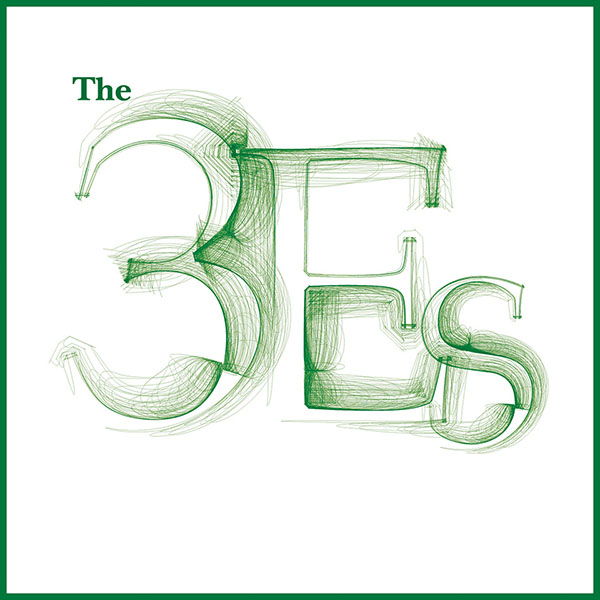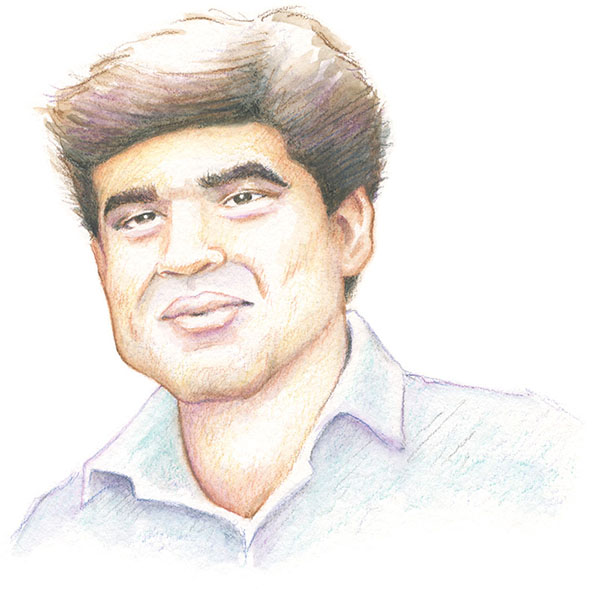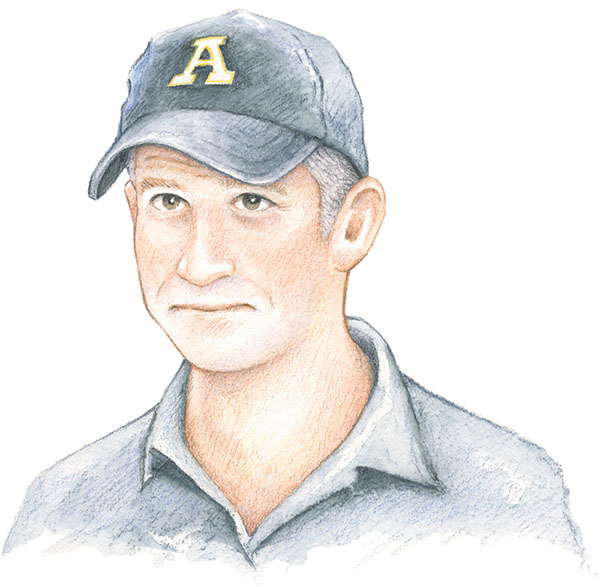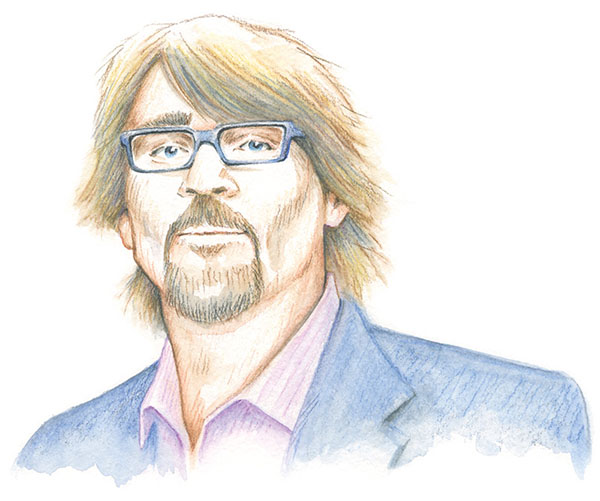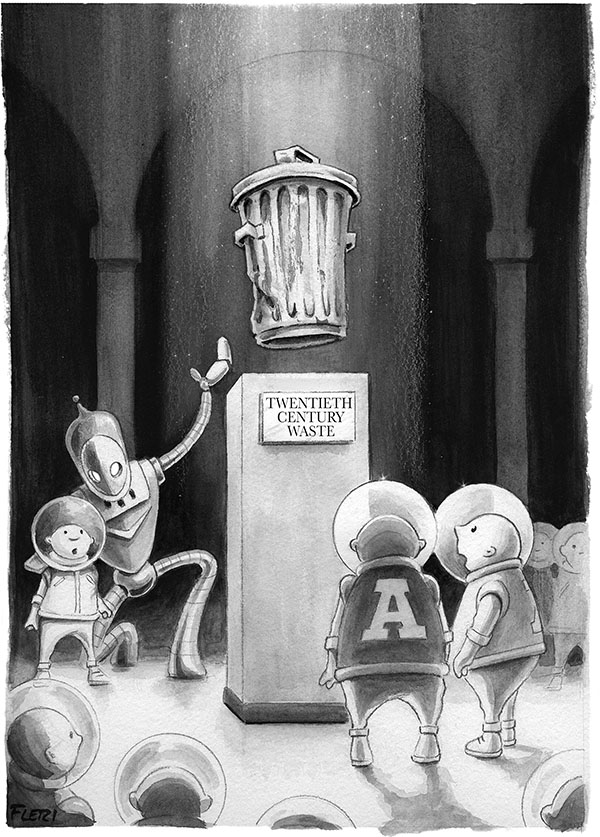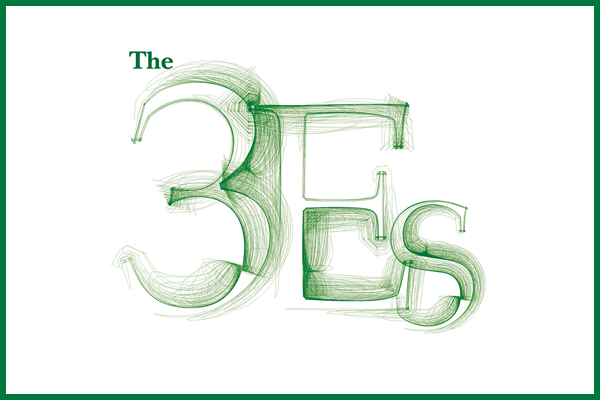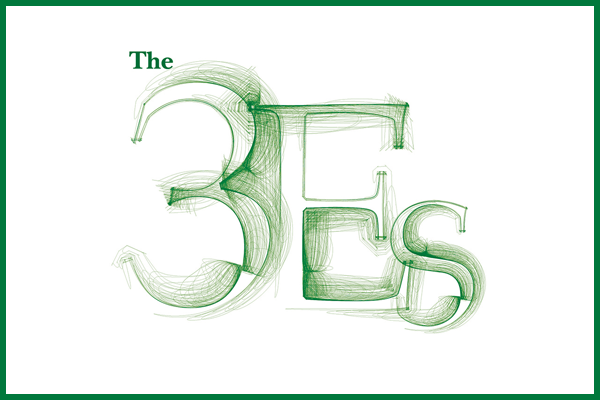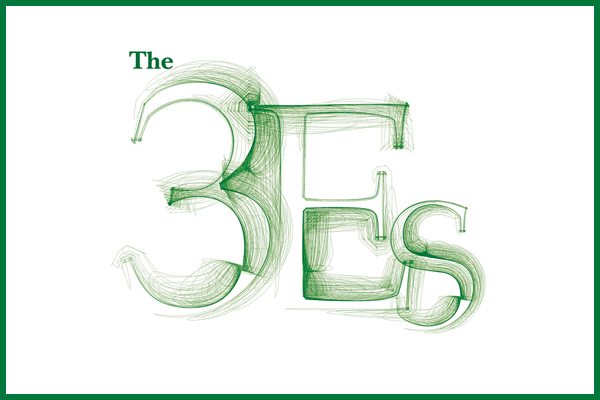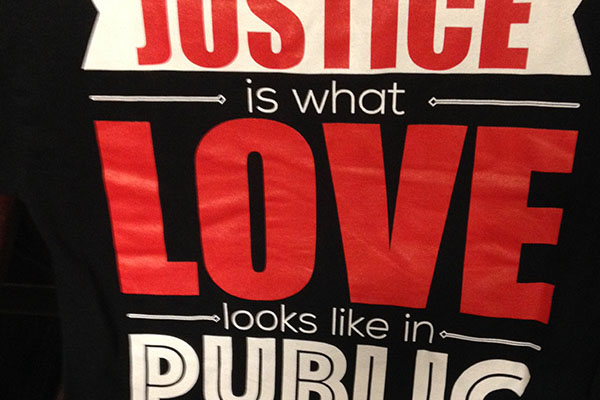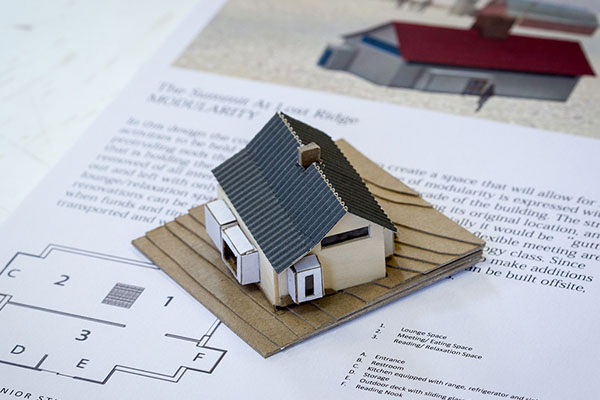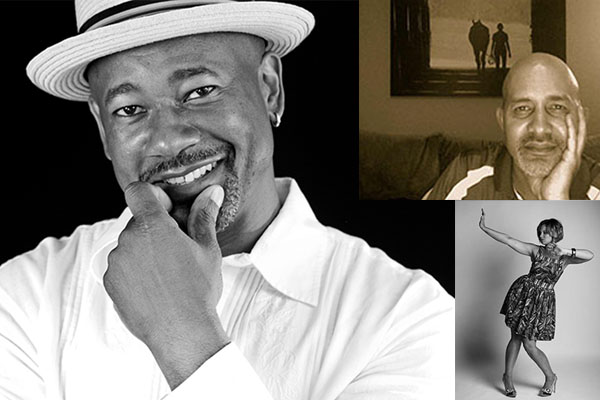Conversations with smart people about stuff that affects our world, and how we affect it
Sustainability goes far beyond reducing our carbon footprint or diverting trash. In this episode, three Appalachian professors share their thoughts how a commitment to sustainability impacts research, creative work, and share how they are teaching Appalachian students to make sustainable choices.
Transcript
Megan Hayes: At Appalachian, sustainability, as many will say, is in our DNA. It’s a part of the culture here, beginning with our university’s founding and growing and evolving over time. We’re at a point now in which our institutional mission asks us to consider the impact we can and do have on our environment, the economic implications of our decisions and the cultural significance – that is, what solutions can we can develop that will encourage social equity in our world? These are really deep discussions, but what better place than a university setting to have them, to build them, to foster the continued evolution of how we will approach sustainability?
We recently had a fascinating conversation about sustainability with three faculty experts, which was a discussion of the “three E’s” that was deep and thorough, and yet it raised dozens more questions, questions for which the answers will compound exponentially.
You’re listening to the end of that discussion now, part 4 in our podcast series on sustainability, in which these experts talk about how they teach sustainability in the classroom. For us, at Appalachian, this is where we really get to the crux of this important work… because fundamentally, our mission is to teach, to encourage rich and deep consideration of this topic within our academic disciplines. In this part of the conversation, I ask them how they do this.
A quick note, if you’re just joining this discussion, there are three other parts, which are fascinating, and we hope you’ll listen to them as well. Let’s introduce our panel, and then we’ll jump right in.
Dr. Dinesh Paudel is an assistant professor in the Department of Sustainable Development, whose research and teaching interests include climate change, identity politics, political economy and subaltern social movements; Dr. Shea Tuberty is an associate professor in the Department of Biology whose research interests are in ecological biology, with a focus on water quality issues. Dr. Tuberty is also co-chair of Appalachian State University’s Sustainability Council; and Dr. Todd Cherry is a professor in the Department of Economics, whose research and teaching interests include environmental and natural resource economics, regional economics and public economics. Dr. Cherry is also the Director of the Center for Economic Research and Policy Analysis at Appalachian and a Senior Research Fellow at the Center for International Climate and Environmental Research - Oslo in Norway.
MH: I would like to bring this back to our campus. Dr. Tuberty, can you talk about how you teach sustainability in the classroom?
Dr. Shea Tuberty: That’s a good point. I was hoping we would do the same thing because I know we can talk about all of the inequities everywhere else but I really want to talk about how Appalachian State University is pushing sustainability in one way or another. How do I teach sustainability? My two classes that are my bread and butter these days are invertebrate zoology, which is all the animals without backbones, which is 98 percent of all animals on earth. The other class is ecotoxicology which is how humans basically effect water quality by putting heavy metals, PCBs, dioxins and pharmaceuticals in situations where wildlife and humans are impacted and trying to understand how those things both effect it and how we can fix it. For sustainability, it becomes an issue of biodiversity for my invertebrate zoology class. I can take them to the Great Barrier Reef or off the coast of North Carolina or even to the creek on campus, which is a great learning outdoor field station. At these places I can show them what the immediate impacts of developing 24 percent of the land use within a small watershed will have and how it will impact water quality. You don’t have to go do high end analysis and use the chemistry or physics department and all of their great instruments over there. You can basically just collect the bugs. I use the same collection method with my 5-year-old and my 25-year-old grad students. Just talking about equity, everyone has the same amount of fun. The only difference is in their ability to actually identify these critters down to the genus and the species. If you can do that even to the orders or families level of the biological hierarchy, you can get a really good idea of what your water quality is based on presence and absence of sensitive or intolerant species. North Carolina leads the country in developing these biological indices.
Dr. Dinesh Paudel: A fundamental of teaching is to understand the root causes of these problems and very pragmatic solutions. Not fixing holes, patching here and there, but thinking through and not repeating the same mistakes. Here is one example. Last February, a few days before Valentine’s Day, I asked my students, how many of you are giving a rose to your best friend? Everyone raised his or her hands. I asked them to think about your flower. Find out where it comes from. It’s a pleasure that flower. But giving one flower, one rose results in deforestation, in cutting down a tree in Cameroon. Flower industry in Cameroon is booming. When you are giving one rose, you are cutting down a tree in Cameroon. Industrial companies control that flower. They bring the flower from Cameroon to Holland and they distribute around the world and that is the exact flower you buy and you give to your best one, your loved one. You also care about sustainability; you are the forefront activist to sustainability. So what you should do? What you have to do is try to discuss from very critical perspective how your own actions, knowingly and unknowingly, are contributing to some of these processes. Unless and until we connect our own actions toward this larger discussion and debate, we won’t understand in full scale. Next thing, we won’t be able to intervene because we remain too superficial. That’s how we are teaching. And it is working very, very well.
MH: Dr. Cherry, one of the things that enlightened me. I came in thinking we need to break out of the environmental framework. Low hanging fruit. It’s all about the environment. How do we talk about the other E’s, sustainability outside of the context of the environment? Dr. Paudel says it’s all about the economy. All about economics. So that’s interesting for me. That’s why I saved you for last. How do you teach sustainability in the classroom?
Dr. Todd Cherry: I think that economics is misperceived by a lot of people. At its core, it’s about how to manage scarce resources. That is economics. Sustainability is essentially taking that concept and applying it over time, over generations. I’ll break it down: it’s about doing the best you can with what you have over time. That is sustainability. The tensions and the questions come up and what I press my students to understand is: what is the best and how do you get there. People have different views on what is the best, what is the outcome they want. But understanding that there isn’t some clear answer, there are lots of trade-offs to be made and they are hard to consider and to analyze. But I think that understanding that whole concept and the breadth of it – it’s not just money, it’s not just prices. There are costs and benefits. Those costs and benefits are monetary, non- monetary, direct, indirect. There’s an old saying that people know just enough economics to be dangerous. That’s when you start thinking it’s all very simplistic; it’s all about money. My family asks about the stock market. I have no idea. I am an environmental economist. I look at environmental policy. They just think economics is about the money. And it is for some people, as an individual that might be their makeup, but in terms of the discipline, it’s a framework for understanding how a society works and how it can work better through policies. Of course if you didn’t have the humans and human systems in the economy then the world would be very sustainable, without us. It’s the interactions between the economy and the natural environment that’s creating these issues. We have to face up to the issues. In grad school my advisor said: “Any environmental economist needs to know a lot about the environment.” You can’t just be an environmentalist; you can’t just be an economist. You have to understand the whole system and how they interact to effectively understand how things work. Once you do, you understand how things work. You can address the questions. That’s what drew me to environmental economics. I like interesting questions. I like it when markets don’t work.
Those are the interesting academic and intellectual questions, when it doesn’t work, how do you fix it? How do you solve the problems? Along those lines is behavioral economics, when people don’t work, when people don’t do the right thing and why. One of the results is if you had to create a problem that just begged for apathy and lack of action and lack of a solution it would have all the attributes of climate change. That is a huge challenge for the system, but also for people. Because we don’t look in the long term as we should. All those things are interesting. For my upper level classes, my students do a lot of research on policy, trying to estimate the impacts and effectiveness of policy and achieving these sustainable outcomes.
MH: I have an altruistic question: what do you see as the future for Appalachian today? Dr. Paudel, I’m going to start with you.
DP: This university has a very unique future and opportunity on this issue. Nowadays, a lot of universities are adopting sustainability and sustainable development is their main thing. Why? Because it is the new buzzword and, oh, the money is there, another opportunity for growth. This university has taken sustainability very differently, very seriously. We have had sustainability for so long, so many years. They are trying to implement and teach. Which is quite reflective in my department, they take it very seriously. It is our main issue. We have a particular geographic location, sort of a marginal land in U.S. systems. Far away from most things. Economically we are not better off in many ways. There are all kinds of ecological systems. Mining. All those issues. Water. So even our geography is the perfect location to understand by research and then we put it out there for the public to understand what does it really mean. So I see sustainable development concepts will gain a lot from this university. One thing this university should do, and it is going toward this direction, is to get a more global and international perspective. Broaden outside our boundaries. Invite people from around the world. Embrace campus diversity in terms of hiring faculty from multiple backgrounds and invite students from all different places. It will help both 1) To enhance and enrich our own knowledge, and another it will help disseminate what we learn.
The best way is not simply by putting one article out there. Sometime maybe 10 people read and it took a year to put it out there. Maybe that is not all the time the best way. The best way is to enhance diversity is to bring in the kind of knowledge we need and that will disseminate the knowledge we have for global good.
We need to sharpen our thinking and sharpen our strategies from a very critical perspective. Don’t take anything as it is. Try to understand why. Keep asking why. That will lead us to some good future. University should allow that curiosity. Why. Why. We sharpen our understanding and put that out there.
TC: Sustainability, as you said, is not a trend, it’s who we are. Sustainability has been a cause a lot of universities have adopted. But ASU is unique in a sense because we have been the faculty in there to actually work toward that with research and applied activities in the classroom. We have technology component on our campus that’s amazing doing the solar decathlon, renewable energy. Environmental sciences are doing great work; in my own department we have one of the strongest environmental groups in the country. We have six environmental economists on our staff. Part of it is the location. There is lot of interesting research questions here and that attracts people. But it is also the university itself. They want to come and work in a place that shares their interest and supports their research activity. What sets us apart is we have actual strengths behind the words and actual activities that lead to contributions for society in terms of sustainability.
ST: Well, I want to parrot the same things these two have just said for they have really great comments. I’d like to build on what Todd just mentioned. And that is that one of the strengths of Appalachian is the community we are built in. I couldn’t imagine a community more interested in water quality and maintaining bio diversity; love of the environment; outdoor sports – and part of the culture of App State, and all the things Todd just mentioned, we have had the sustainability program, one of the first in the country, in North America. And another of the strengths is the number of non-profits, the conservation groups. I work with them constantly and am very aware of the type of expertise they draw to Boone. These are my colleagues in a lot of ways. They are teaching my students in the community-based research projects we do. I’m on the phone or emailing them constantly about efforts to fixing a wrong or to share information about something they may know of that I’m basing a teaching model on. The average Boone-ite, just go to the Saturday market and share a cup of coffee with some of these people. You’ll realize we have a shared interest. People who come to Boone come here not just to get away from heat in Florida or to enjoy the ski resorts. They come for clean water. They want the fresh air, a forested view shed that in their minds has never been impacted. So I think we are poised to make an international contribution to sustainability. We are ranked very highly in both faculty lead and short-term international trips and in sustainability.
We are pretty much breaking all the confines that many of our state institution partners would think that we have. “You’re just a sister school up in the mountains servicing the mountain folk.” But when they realize that we, as a comprehensive university, send more people abroad than just about anyone. I think we rank second or third. And we’re two hours away from an airport! How do we pull that off – because the faculty and the community wants to do it. It’s not something we’re doing just to say we have this lackluster effort. We have this incredible landmark institution in those ways. It comes back to the fact we are supported, not just by the faculty and the students who are drawn to App, but by the community around us. As small as it is, we’re very focused on our sustainability efforts – the local food community, the small farm community, the equity efforts. I’m proud to call Boone my home. People who come here – and my two colleagues here are among them – could get a job anywhere. But we come to Boone for the quality of life and we want to maintain that life. They don’t want to come here and close the door behind them but want to make sure anyone else who comes here knows about and contributes to that effort. I hope in my own little way. And I think that the university, in choosing this as a strategic plan, is one of the best things it could have done, not just for the university but also for the community.
What do you think?
Share your feedback on this story.
An Appalachian State University faculty expert roundtable discussion
An Appalachian State University faculty expert roundtable discussion
Conversations with smart people about stuff that affects our world, and how we affect it
About Appalachian State University
As a premier public institution, Appalachian State University prepares students to lead purposeful lives. App State is one of 17 campuses in the University of North Carolina System, with a national reputation for innovative teaching and opening access to a high-quality, cost-effective education. The university enrolls more than 21,000 students, has a low student-to-faculty ratio and offers more than 150 undergraduate and 80 graduate majors at its Boone and Hickory campuses and through App State Online. Learn more at https://www.appstate.edu.
